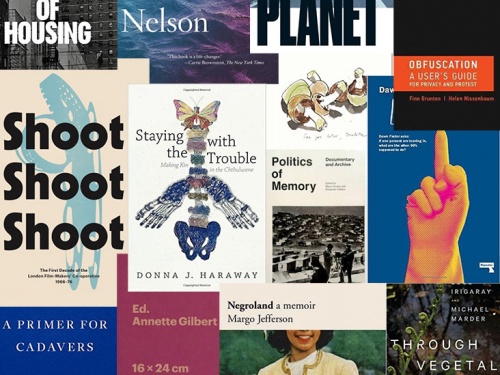Why Read: Ivan Illich’s The Right to Useful Unemployment and its Professional Enemies?
In the first of a new series, ICA Student Forum member Jenn Pavlick explores why we should read Ivan Illich's The Right to Useful Unemployment and its Professional Enemies, reflecting on how the text is still relevant today. The text formed the basis for the first TEXT2SPEECH meeting of 2016, a free reading group which provides a platform for the discussion of texts selected by practitioners, academics and student forum members. The meeting was co-hosted by The Alternative School of Economics - a collaborative platform created and run by artists Ruth Beale and Amy Feneck.
Profound despite its short length, and conceptually accessible despite being a continuation of a previous work, The Right to Useful Unemployment puts forward tools for changing the nature of a market-driven society.
Initially trained as a Catholic Priest, Ivan Illich’s eclectic career includes the founding of Centro Intercultural de Documentación at Cuernavaca, Mexico and the authoring of multiple books which critique institutional pillars of Western Culture. He was born in Austria in 1926, before he moved to Mexico, and then later to the United States. Illich’s thinking and critique is aligned neither with the left nor the right; he was inclined to critique the idea of a welfare state yet expressed an adamant disapproval of professionalisation. He is thus positioned as an anomalous figure with a unique and insightful understanding of society.
"Illich suggests we utilise moments of 'crisis' to foster an alternative mode of organisation."
In The Right to Useful Unemployment and its Professional Enemies Illich unpacks a web of social constructs which largely remain pertinent, nearly forty years later. Through an overarching aim to problematise the role of market-dependence in obtaining a convivial way of operating, he anchors the text around notions of crisis, modernized poverty, convivial austerity and professionalisation. Today, imperatives for austerity have become the norm within economic policy across Europe, and the influx of Syrian refugees seeking asylum is testing the European Union’s resources, ideology and humanitarian threshold. These conditions resonate with Illich’s vocabulary centred around: ‘crisis,’ ‘austerity,’ and ‘poverty,’ which continue to emerge as defining sentiments of Western politics.
Illich suggests we utilise moments of ‘crisis’ to foster an alternative mode of organisation. Governments and institutions handle crisis through the implementation of often aggressive, overzealous, and heavy-handed policy. Instead of augmenting the power held by the elite, he insists that crisis indicates an instance of choice: “that marvellous moment when people suddenly become aware of their self-imposed cages, and of the possibility of a different life”.
As he aims to achieve a more ‘convivial society,’ Illich unpacks the concept of ‘modernized poverty’ as an oppositional factor. With the exception of the mega-rich, who can disappear into luxury, he understands everyone else as living in conditions of ‘modernized poverty.’ Within this, the proliferation and dominance of commodities prevents any autonomous living, culturally shaped use-value, and subsequently renders satisfaction outside of market-relations impossible. He instead suggests a method of ‘convivial austerity,’ where people would put a limit on the maximum amount of power that anyone could hold, re-activating the possibility for personal use-value.
"Much of The Right to Useful Unemployment reads as neo-luddite nostalgia for pre-industrial modes of production."
These ideas are relevant to contemporary conditions, however his critique and proposed solutions have problematic aspects and areas of ambiguity. Illich identifies technology as the primary tool in the increasing commodification-of-everything, and in this way, his critique of commodity-culture assumes a rejection of technology. He seems to value a mode of production where people make things themselves, and therefore, much of The Right to Useful Unemployment reads as neo-luddite nostalgia for pre-industrial modes of production and community. His critique of the professionalisation of all roles in society aptly interprets a phenomenon that builds hierarchy, market dependence, and decreases convivial modes of living. In contrast, however, he suggests taking up ‘useful unemployment,’ where being unemployed does not imply poverty or dependency. For him, unemployment is a radical opportunity for ‘frustrated workers’ to organise and become useful outside of activities that serve the production of commodities. But, for whom is this possible? Surely unemployment is only feasible for the wealthy classes. Is this not overly optimistic?
If Illich recognizes the ways in which the proliferation of commodities determines the individual’s understanding of their own needs and desires, then how can his solutions actually be possible escapes? How will individuals be convinced that unemployment is desirable, or, more desirable? Is commodity-driven society not determining one’s desires in the first place? His yay-revolution-esque tone seems dated. It may have resonated with a culture of optimism at the time, but today it reads as unconvincingly hopeful.
Illich’s shrewd observations regarding market-dependence anticipate present conditions, and mark this text as relevant, vibrant, and certainly worth reading. However, the solutions he offers add a level of complexity. Through his hopes and critiques, is he simply glorifying a version of the past-that-never-was? Is any of this possible and practical, or are these overly idealised visions that cannot be activated in the present social, economic, and political web of circumstances that we face today? ■
TEXT2SPEECH is a series of reading groups organised by the ICA Student Forum to provide a space for debate around an eclectic range of texts, with each meeting topically responding to a part of the ICA’s current programme. The group is free to join and open to all, encouraging anyone with an interest in contemporary art and theory to join either regularly or for one of the meetings.
Join us for the next meeting on 12 May, exploring Hito Steyerl's essay The Terror of Total Dasein.
This article is posted in: Blog, Student Forum
Tagged with: Ivan Illich, Why Read, ICA Studentforum, arts education, TEXT2SPEECH, learning, Jenn Pavlick, The Alternative School of Economics, books, Review, Book Review








